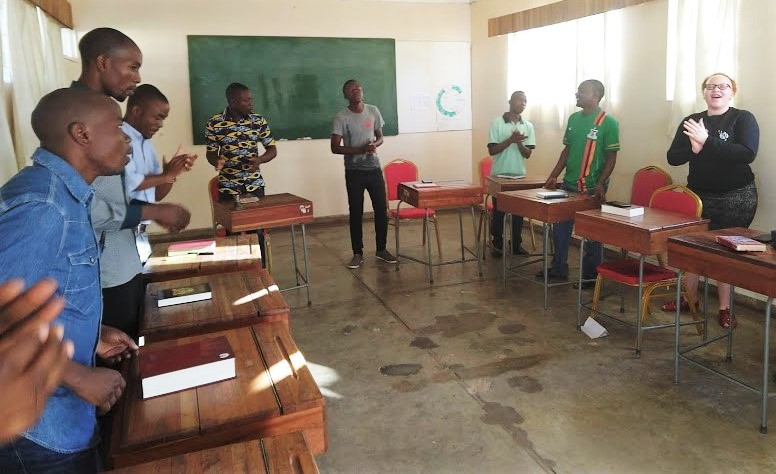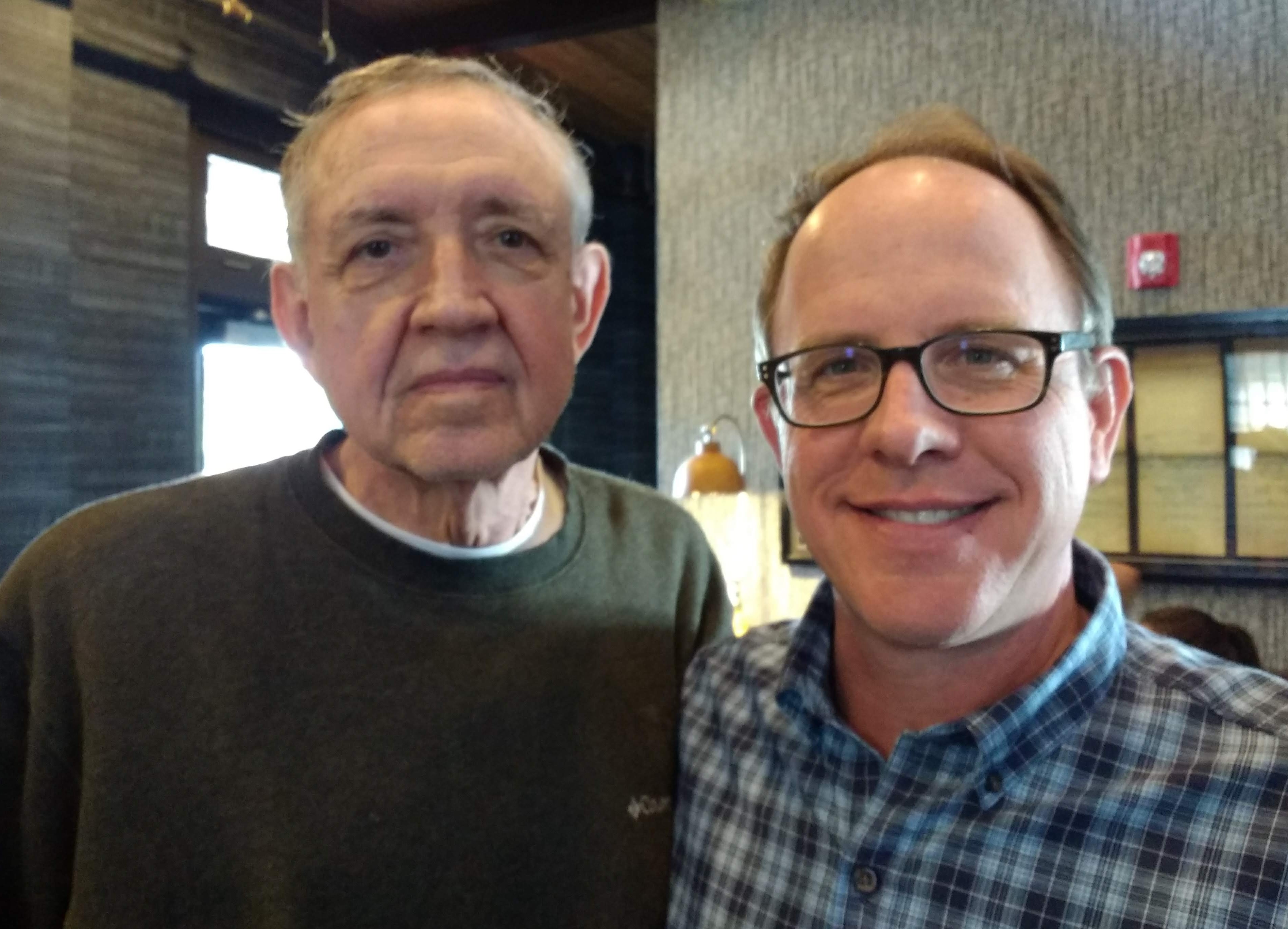A letter from Sherri and Dustin Ellington, serving in Zambia
October 2019
Write to Dustin Ellington
Write to Sherri Ellington
Individuals: Give online to E200478 for Dustin and Sherri Ellington’s sending and support
Congregations: Give to D507543 for Dustin and Sherri Ellington’s sending and support
Churches are asked to send donations through your congregation’s normal receiving site (this is usually your presbytery)
Dear friends,
A theme I’ve often found significant for my relationship with God is strength in weakness; the two seem to go closely together in the Christian life. I’ve always been intrigued by the apostle Paul’s words, “When I am weak, then I am strong” (2 Cor 12:10).
A main goal of mine in 2019 has been to draw closer to God and to learn more how Justo Mwale University and Zambia can be a place where that happens for me. One “action step” toward this goal was to attend a nine-day retreat called “Breathe” in July. The setting of the retreat was one of outdoor beauty, and the point was to give everyone space to get refreshed and take a deep breath of God’s presence through the times of worship, teaching, prayer, reflection and conversation. Meanwhile Sherri and I, and especially Sherri, were quite sick throughout the retreat. It felt ironic that we were attending a conference called “Breathe,” and she could hardly breathe, and we both felt miserable.
Something I didn’t realize ahead of time was that a main focus of the retreat would be how our weaknesses and wounds can be the very things that open our lives to God’s presence and grace. The speaker helped us see that our disappointments and failures help us to welcome God, so that our inadequacy becomes his route to get through to us. Sherri and I were encouraged, even as we felt physically weak. We were also able to look back on difficult times such as when we had to leave Egypt, and recognized signs of God’s presence.
Little did I know that the coming academic term would plunge me into the midst of circumstances that would bring me face to face with the very lessons we reflected on at the “Breathe” retreat.
For the first time, I’ve been able to teach Justo Mwale’s course on Paul’s letters, which can seem different to read here in Zambia versus reading them in America. As my students have looked closely at Paul’s thoughts, they have been struck by how he put himself into situations of vulnerability, and by how he taught his congregations to take paths of self-sacrifice for the church and the gospel. It looks like planned weakness and vulnerability, for the sake of knowing Christ and advancing the gospel. This has been quite a challenging picture for the students, and for me as their teacher, since perhaps most of them have known need and vulnerability much of their lives, and they know that such things are not glamorous but painful. It’s also startling to read Paul’s letters closely, because a big emphasis of Christianity in this part of the world is on faith and ministry as a path toward material well-being and success. Just this morning a student shared in class that most people in his home country believe that if you’re passing through suffering, you’re not a Christian. And yet Paul’s letters keep bearing witness to vulnerability (at least in this life) for the sake of God, others, and the gospel, and designate that path as marked by God’s power and presence. We’re having open conversations about what we find in Scripture; I appreciate prayer for my students and myself as we wrestle with what it means to respond to what we’re seeing.
Around September 15, I received news that my father was declining rapidly. I got a plane ticket to head back to Kentucky. I didn’t make it before he died, but I spent what felt like a blessed week with my extended family, reflecting on Dad’s life and sharing in his funeral. He had told my stepmother that he appreciated the passage in Ecclesiastes 3 that speaks of a time and season for everything, and of God making all things beautiful in their time. There’s a time to be born, and there’s a time to die. There’s a time to tear and a time to sew or mend. I thought of how our hearts sometimes need to be torn, so that they can ultimately be mended. I think that was happening to Dad in the past several years. He had had some hardness and unforgiveness, but it seems his aging and sickness helped to allow for his heart’s healing. My stepmother, Rita, said in those last few days she spent with him at the hospital, about forty staff members came and shared how much Dad had come to mean to them in the 17 months he was there with Alzheimer’s. How had he touched their lives without a functioning mind? I think God had been making Dad’s heart beautiful. It seems like a sign of Christ’s presence, and it gives me hope.One of the tough things about life in Zambia since our arrival nine years ago has been how everything seems to come to a halt when anyone dies so that people can, constantly it seems, attend funerals of people they hardly know. I’ve tended to see this as a weakness in the culture. But as soon as news got out that my father was dying, and before I left for the airport, our head of school, Professor Soko, met me teary-eyed and held both my hands for a long time. It was the first time I became able to feel the reality of what was happening; I hadn’t been ready to grieve. Then one of my students came to me with tears in his eyes because of my dad. I was deeply touched; I knew it must be okay for me to feel the weight of what was occurring. When I was in the U.S. for a week, I received many notes from Zambia and I felt myself buoyed by the Justo Mwale community’s prayers. Students kept referring to my dad as their “grandfather,” and some colleagues called him their “father” though they had never met him. They felt a connection both to him and my grief. As I have found myself on the receiving end, I’ve been able to see that what I thought was a weakness is, from a different angle, a strength. I have drawn so much strength from African brothers and sisters as they have walked with me the past few weeks. I can now see that, for many Zambians, times of death and funerals are when they become very real before one another and before God. Such times must be a way they receive God’s strength to bear their own many losses. Now I’m partaking of this strength.
Thank you for allowing me to share bits of my recent journey. Gradually, Sherri and I are learning that God’s grace is sufficient, no matter the weakness we encounter around us or within us. Thank you for being on this journey with us. We so appreciate the support, care and prayers of friends like you.
Yours in Christ,
Dustin (and Sherri) Ellington
ellingtondustin@gmail.com – Dustin
so.ellington@gmail.com – Sherri
Please read this important message from Sara Lisherness, interim director of Presbyterian World Mission
Dear friend of Presbyterian Mission,
Greetings in Christ! As the interim director of Presbyterian World Mission, I am grateful to have the opportunity to thank you for your continued support of PC(USA) mission co-workers.
The enclosed newsletter bears witness to some of the many ways in which God is at work in the world through long-standing relationships between global partners and the PC(USA).
These partnerships are nurtured and strengthened by the presence of mission co-workers in over 40 countries; you are an important part of this partnership too, as you learn about and share how our church is involved in global ministry; as you pray for our partners and mission co-workers; and as you take action to work with others for God’s justice, peace and healing.
I write to invite you to continue joining us in partnership in three ways. First, your prayers are always needed. Please pray that God will continue guiding the shared work of the PC(USA) and global partners as we engage together in service around the world. Pray, too, for mission co-workers, that they may feel encouraged in the work they are doing under the leadership of global partners.
Second, please consider making a year-end gift for the sending and support of at least one mission co-worker. There is a remittance form at the end of this letter and an enclosed envelope so that you can send in a special year-end gift.
Finally, I encourage you to ask your session to include one or more mission co-workers in your congregation’s mission budget for 2020 and beyond. PC(USA) mission co-workers’ sending and support costs are funded by the designated gifts of individuals and congregations like yours; your gifts allow Presbyterian World Mission to fulfill global partners’ requests for mission personnel.
Faithfully in Christ,
Sara Pottschmidt Lisherness
Director, Compassion, Peace and Justice Ministry
Interim Director, Presbyterian World Mission
![]() You may freely reuse and distribute this article in its entirety for non-commercial purposes in any medium. Please include author attribution, photography credits, and a link to the original article. This work is licensed under a Creative Commons Attribution-NonCommercial-NoDeratives 4.0 International License.
You may freely reuse and distribute this article in its entirety for non-commercial purposes in any medium. Please include author attribution, photography credits, and a link to the original article. This work is licensed under a Creative Commons Attribution-NonCommercial-NoDeratives 4.0 International License.

